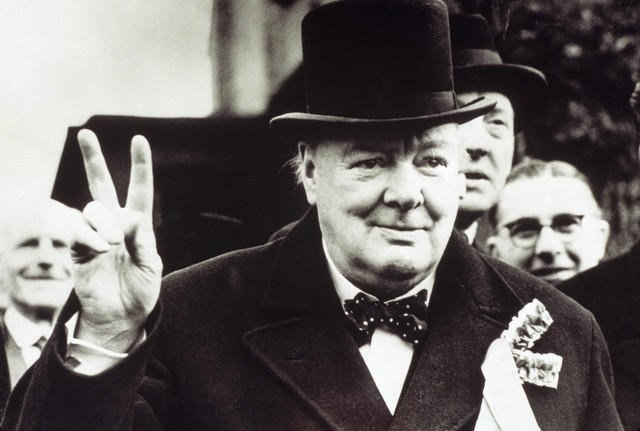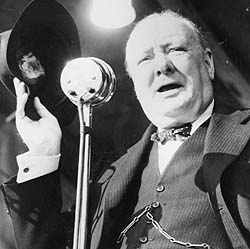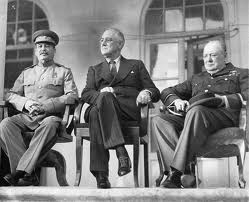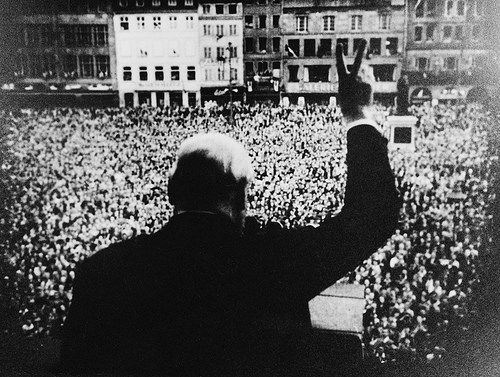 |
| Winston Churchill near parliament (http://gardenofpraise.com/ibdchrch.htm) |
Those were the words of an optimist, politician, and most importantly, an inspiring patriot. Sir Winston Leonard Spencer Churchill was born on November 30, 1874 to the wealthy Lord and Lady Randolph Churchill in Oxfordshire, England. After his formal education and army tenure in the 4th Hussars (a cavalry regiment), Churchill entered the House of Commons in the British Parliament in January of 1901, rising up the democratic hierarchy, eventually becoming First Lord of the Admiralty in 1911. His most notable position was his appointment to Prime Minister of Britain during the Second World War, a war he had foreseen and warned of years before. During this time he would lead Britain for nearly the entire war, rallying the English people to continue the fight against fascism, despite the odds against them. Winston Churchill deserves to be recognized as a hero of democracy for his leadership of the British people during World War II.
 |
| Churchill gives a speech during the war years (http://www.culture24.org.uk/history+%26+heritage/war+%26+conflict/modern+conflict/art26783) |
Winston Churchill was one of the most courageous figures in political history. He made his country’s priorities his own priorities and put them before his own safety and security. Instead of evacuating London during the bombings, he stayed behind in the capital city. “While the battle raged, Churchill turned up everywhere. He defied air-raid alarms and went into the streets as the bombs fell. He toured RAF headquarters, inspected coastal defenses, and visited victims of the air raids. Everywhere he went he held up two fingers in a "V for victory" salute. To the people of all the Allied nations, this simple gesture became an inspiring symbol of faith in eventual victory.” (Thompson, Carol). In his new position as prime minister during World War II, Churchill had the tremendous weight of the responsibility of leadership on his shoulders. Winston Churchill did far more than was expected for a man of his scope. He worked constantly, in a surprisingly hands-on fashion, to do everything in his power to ensure the success of the wartime United Kingdom. Churchill convinced Britain to stand strong even in the face of overwhelming odds in their fight against the Axis Powers. After the surrender of France to Germany in 1940, Britain was the last major European holdout against Axis forces. “The United Kingdom now stood alone. A German invasion seemed certain. In a speech to the House of Commons on the day after France asked Germany for an armistice, Churchill declared: ‘Let us therefore brace ourselves to our duties, and so bear ourselves that, if the British Empire and its Commonwealth last for a thousand years, men will say, 'This was their finest hour.'” (Thompson, Carol). In the face of such poor odds in a war, most politicians would quickly crumble and surrender. But not Winston Churchill. Sir Churchill understood that fascism had to be subdued to ensure democracy’s survival, and fascism could only be subdued by war. He knew the terrible ramifications that would ensue in the event of an Axis victory. He knew that the future of the world’s democracies depended on the defeat of Germany and its allies. Churchill saw that Britain had to continue to act as a catalyst for the preservation of freedom in Europe, so he pushed forward. He convinced the British people to adopt that persistence. Winston Churchill’s stoic courage made him not only the strong, uncompromising leader England required to counteract Hitler; he also became an example to his countrymen of the staunch bravery needed to overcome the war.
 |
| The Big Three (http://www.afterimagegallery.com/nytbigthree.htm) |
Winston Churchill worked tirelessly to improve not only Britain, but also to ensure a bright future for the postwar world. Even during the dreaded bombings of London (the Blitz); the British people’s darkest hour during World War II, Prime Minister Churchill rallied his people wholeheartedly. “One of the major contributions made by Churchill to eventual victory was his ability to inspire the British people to greater effort by making public broadcasts on significant occasions. A brilliant orator he was a tireless source of strength to people experiencing the sufferings of the Blitz.” (Spartacus.Schoolnet). Sir Churchill vigorously managed Britain as he struggled to keep the British people’s will from breaking. His inspiring words were a beacon of the hope of victory for his battle-weary countrymen. He kept his all his people; the factory workers, the soldiers, the children, motivated to press on to ultimate victory. Churchill even went on to expand his work, conferring with allied leaders to plan a united and coordinated war effort, and to plan the future of the world’s democracies, within Britain and beyond. During a speech in the U.S., Churchill noted; “—the President has traveled a thousand miles to dignify and magnify our meeting here today and give me an opportunity of addressing this kindred nation, as well as my own countrymen across the ocean and perhaps some other countries, too. The President has told you that it is his wish, as I am sure it is yours, that I should have full liberty to give my true and faithful counsel in these anxious and baffling times.” (Churchill, Winston). Despite his encouragement of tough foreign policy, Sir Churchill openly embraced the idea of working with America to attempt to foster lasting peace in the postwar world. Winston Churchill channeled his strong convictions into his work ensure the prosperity of democracy, first spurring Britain to victory, and late in his life by working with world leaders to plan organized, just, and freedom-loving governments in the postwar era.
One of Winston Churchill’s most prevalent qualities was his determination. The Prime minister’s persistence was put to test publicly during the years in which the Axis dominated WWII. It was said about Churchill that, “…his strong personality and forceful determination made him a popular figure during the war years…” (Tyle, Laura). Even in the wake of the previous prime minister’s resignation, Sir Churchill openly encouraged the British people to meet the war head-on, and to never give up. Winston Churchill’s charisma and rousing, nationalistic words gave the British people hope of victory in the near hopelessness that was World War II. Mr. Churchill was unrelenting in the face of probable defeat. Not only did he express determination in the area of wartime politics, Winston Churchill steadfastly stood by his honest personal convictions, even at the cost of his political popularity. A colleague recounted this about Churchill: “‘He absolutely refused to yield to our persuasions, and said bluntly that he would rather lose votes than abandon his convictions.’-J.R. Clyne” (Spartacus.schoolnet). Winston Churchill had long warned that Britain had to keep a firm foreign policy with other countries, but his aggressive outlook on non-democratic countries was branded as warmongering. This came back to haunt him once again near the end of WWII. The tide had turned for the Allies, and soon, voters found Churchill’s assertive doctrine obsolete, and he was voted out of office in 1945. But he continued to stand by his values and convictions as what he believed was best for his country. Sir Churchill always committed his actions deliberately, and he used his values as a guiding principle for his governing policies.
 |
| Churchill making a speech (http://www.flickr.com/photos/councilofeurope/3047610865/) |
Churchill’s urging to his people to make war for the victory of democracy and the English way of life is truly one of the most patriotic war efforts of any politician. The British people followed the bravery and determination exemplified by their prime minister to muster the strength and hope needed to overcome the fascist empires. Churchill’s principles of nationalistic unity and firm foreign policy are by no means obsolete. The integration and camaraderie in the British army and society due to Churchill bolstered hope and motivation for triumph over fascism. His example is still applicable today. As democracy still faces challenges, Churchill’s doctrine is a shining standard for citizens to band together and face challenges as one country, one people. Churchill’s philosophy and political tactics clearly display the success which stems from loyalty to one’s convictions. He shows that persevering according to honest personal values can accomplish great things and inspire people to improve their community. Winston Churchill actively inspired the English people to do everything in their power to contribute to a successful war effort for the survival of democracy. Like most successful leaders, his people followed him as an example more so than as a ruler. Just as Germany, in a moment of desperation, had turned to the vile Hitler as a leader, Britain turned to the heroic Churchill.
Churchill, Winston. "Iron Curtain Speech, . . . March 5, 1946." The Cold War. Ed. Walter Hixson. Woodbridge, CT: Primary Source Media, 2000. American Journey.Gale Student Resources In Context. Web. 14 Dec. 2010.
"Churchill, Winston." UXL Encyclopedia of World Biography. Ed. Laura B. Tyle. Vol. 3. Detroit: UXL, 2003. 472-475. Gale Virtual Reference Library. Web. 14 Dec. 2010.
Thompson, Carol L. "Churchill, Sir Winston Leonard Spencer." World Book Advanced. World Book, 2010. Web. 15 Dec. 2010.
“Winston Churchill: Biography. “www.Spartacus.Schoolnet.co.UK. Spartacus Educational, n.d. Web. 14 Dec 2010
Page created on 1/17/2011 12:00:00 AM
Last edited 1/17/2011 12:00:00 AM
